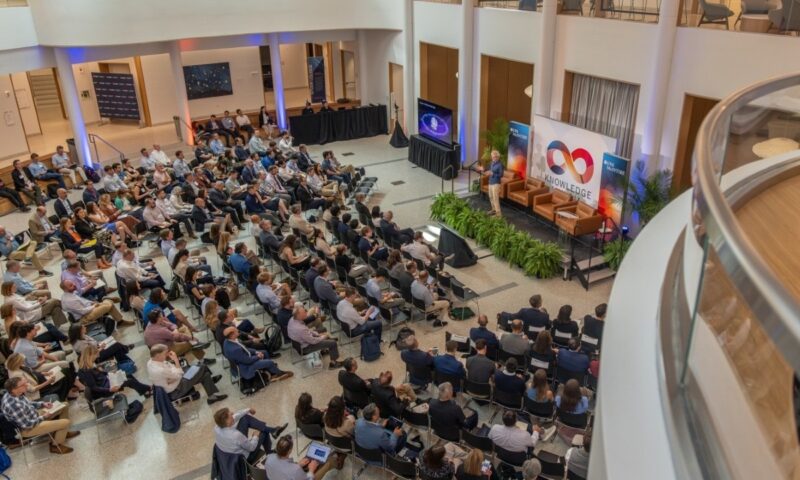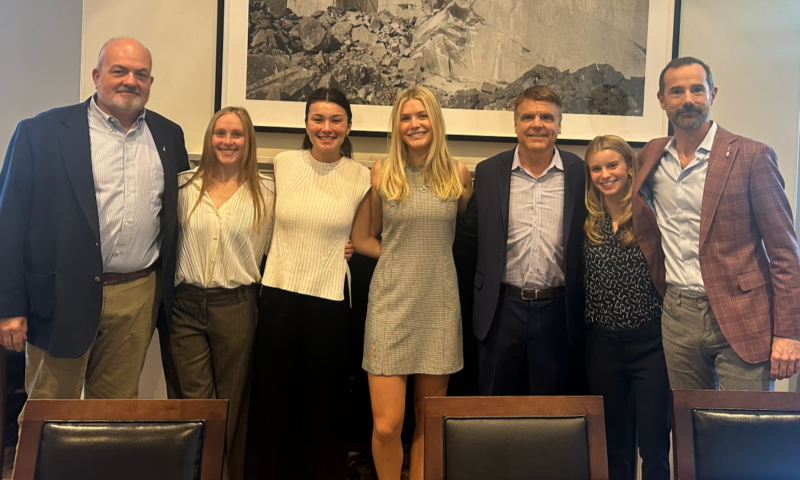Students earning degrees at schools across UVA continue to be drawn to McIntire, intrigued by a broad set of topical possibilities to explore, offered through Commerce School-hosted minors in Entrepreneurship, Leadership, and Real Estate.
Specially designed to provide access to many subjects and practical experience in a variety of fields, each of the 15-credit courses of study was created with the flexibility to meet students’ needs on multiple fronts, including self-discovery, skill development, and important considerations concerning graduation requirements, freeing undergraduates to follow their interests and pursue their passions.
As the 2022-2023 academic year kicks into full gear, we thought we’d hear from the McIntire faculty directing each of the minors to learn about pertinent updates, as well as speak to University students enrolled in the programs to discover what they hope to gain from the innovative, collective curriculum of each in order to reach their academic goals and future professional aims.
New Elective Options in Entrepreneurship
The Entrepreneurship Minor is bringing more expertise and choice to future founders, policymakers, technologists, executives, startup team members, investors, and others.
McIntire Professor Eric Martin, who also serves as Director of the School’s Galant Center for Innovation and Entrepreneurship, says that welcoming new team member Professor Alex Zorychta generates a substantial boost to the program.
“Alex will be bringing his real-world entrepreneurial experience and his terrific track record of teaching and community building from the program in the School of Engineering and Applied Science to ENTP 1010, Startup: An Introduction to Entrepreneurship. This addition allows us to offer over 250 seats in the introductory course to students from every school across Grounds each semester.”
In addition to course choices tailored in the minor’s concentrations of Innovation in Business, Social Entrepreneurship, and Technology Entrepreneurship, Martin says that several new courses from the College of Arts & Sciences and McIntire’s Study Abroad programs round out the lengthy list of electives available to “eMinor” students. Further still, starting this fall, UVA students will also have access to the new, half-credit Side Hustle courses that may be stacked for credit as an elective.
As the minor is pan-University, Martin notes that collaboration between McIntire partners at the Batten and Engineering schools now reach nearly 10% of UVA students through coursework. Outside of the classroom, that partnership extends to supporting co-curricular and extracurricular events. “They enliven and support the overall UVA ecosystem, including our friends at UVA Wise,” he says.
Working in conjunction with Batten and Engineering, McIntire hosted SPARK on the first Saturday of the school year the which, Martin explains, unites current student and young alumni founders with first-years to introduce them to the world of innovation and entrepreneurship at UVA. “In addition, on Sept. 14, McIntire and our friends from Darden, SEAS, and Batten hosted a University-wide entrepreneurship information session featuring our impressive array of on-Grounds academic programs,” he says, adding that other clubs, organizations, and events were also involved, forging stronger connections between entrepreneurial experiences to classroom learning.
Other changes to the program allow for even more flexibility and applied learning. “We recognized the synergy between our McIntire minors by finding courses that may be taken for credit in, say, Real Estate or Leadership, but are offered by the Entrepreneurship faculty,” Martin says. “Finally, each semester, we add new teaching approaches in our existing courses. One of note is the introduction of an Integrated Core-like, semesterlong, real-time innovation project in partnership with world-class companies like Electrolux, Allianz, and Lowe’s.”
Innovative Mindsets
Second-year Pavel Akmaev (UVA ’25) from Sudbury, MA, who plans to apply to McIntire and concentrate in Finance, says the Entrepreneurship Minor’s versatility and practicality were his main reasons for enrolling, and he now envisions his future in a career dedicated to innovating and brainstorming new ideas for whatever company he joins. “After taking my first Entrepreneurship course with Professor Martin, it was clear to me that the creative freedom associated with entrepreneurship was an interest of mine, and I wanted to pursue entrepreneurship academically as far as I could at UVA through the minor,” Akmaev says.
Explaining that the subject has already provided him with a great deal of “utility in the career exploration process,” he’s also been able to use what he’s learned in having a growth mindset to tackle problems in his academics.
Richmond, VA, native Cappy Slocum (Batten ’24) says that though she was interested in enrolling in the minor because she felt that the educational opportunities at McIntire would complement her Public Policy and Leadership courses, she’s found entrepreneurship to be broad, versatile, and connected to coursework in any area.
“It requires a balance of analytical and creative skills that apply to any study or career path. In my case, I have found policy and business to be very interconnected; policy changes can directly affect the regulations and channels of the business world, so I wanted to make sure I had a strong grasp on both aspects,” Slocum says, noting that Martin’s passion for the subject and success of his students drove her to enroll.
Of all of the many concepts she imagines will be beneficial to her future successes, she, like Akmaev, says that having an entrepreneurial mindset is one of the most valuable concepts she’s cultivated thus far. “It allows you to take advantage of your current situation and resources, as well as find growth opportunities. With this mindset, you learn from your failures and develop creative, innovative ideas. Professor Martin has taught us that many aspects of entrepreneurship can apply to our lives, no matter how different they may seem to be,” says Slocum.
Leadership Minor Increases Flexibility
Professor Jeffrey Lovelace, Director of the Leadership Minor, says that while no major curriculum changes are in play this year for the program, there is an increased emphasis on functionality for students who hope to lead within their chosen profession.
“We have made it easier for students to apply for electives to fit with our Persuasion & Influence elective or our Open Leadership elective,” Lovelace says. “Our goal is to help students develop into better, more self-aware leaders with the skill sets they need to make a difference in their organizations immediately after graduation.”
Following a dormant period for the Leadership Minor, Lovelace revamped it over the span of three years, making strides to fashion a program that is more accessible to undergrads from any of UVA’s schools. “It is important to us that students can build this minor in an interdisciplinary way to work with their major area of study,” Lovelace says. “As an example, we worked with the English Department to identify a series of classes that can count toward our pre-approved list of electives for the Persuasion & Influence elective.”
Aiming to alleviate concerns about the number of credits interested students are taking outside of the College, Lovelace says they are also creating pathways for students to request courses to count for their elective classes. “That way, if there is a class that is leadership-focused and for a grade, and that meets the intent of the different elective options for the minor, we can make it work for the student’s plan of study,” he says.
Last spring marked the graduation of the first full cohort of the reconstituted minor. “We are really excited about that. We also had our highest number of applicants and acceptances in the spring for the new cohort,” Lovelace says, pointing out that Professor Paul Seaborn ran the first full practicum course, in which students were exposed to a number of accomplished leaders from various professions. “They also got to work with real businesses in the local area, helping them examine real-world leadership challenges. The semester closed with the student teams briefing their client with a series of recommended courses of action.”
Leading Now and Later
Michael Chih (A&S ’23), a fourth-year from Fairfax, VA, who serves as Director of Analytics for UVA Softball and Campus Brand Ambassador for Hilton, decided to minor in Leadership to further develop leadership abilities he began to hone in high school. In addition to learning about different leadership styles and traits of people who study leadership, Chih says the coursework has taught him not only to be an effective leader, but also “the importance of being a good follower as well.”
Emma Soistmann (A&S ’23), an American Studies and English double major from Lynchburg, VA, says she came to UVA unsure of exactly what she wanted to study. Though she ultimately decided that she was interested in the humanities, she was still hoping to get some exposure to business courses, which led her to the McIntire’s minors.
Considering leadership one of her strengths, she took Lovelace’s introductory course in the minor and was hooked. “I enjoyed how we combined research, cases, and firsthand experience to understand how we can be leaders in the future and in our lives now,” Soistmann says. “So far, the information I have learned through the minor has been incredibly beneficial at UVA.”
Soistmann notes that she has used the experience in the clubs she’s a part of in order to lead teams. “We also spend a lot of time [in the class] working in groups, which has been incredibly valuable when it comes to group projects,” she says, crediting the class with helping her support her team at her internship this past summer. “I even had a mentor tell me how important the things I will learn through a leadership minor will be when I enter the workplace.”
Ongoing Developments in Real Estate
The newest minor hosted at McIntire, Real Estate, is only one academic year old. As such, the Director of the program, Professor Drew Sanderford, says that though major changes won’t be reshaping Real Estate just yet, the cross-curricular minor continues to expand its elective course list as faculty explore possibilities for students interested in studying the subject in its many related areas.
“It’s an exciting process to learn what’s going on around Grounds,” says Sanderford, who also serves as Director for McIntire’s Center for Real Estate and the Built Environment. “As a new program, our approach hasn’t changed; we learn from our partners and work to execute and grow the program in reflective and inclusive ways.”
That development has resulted in the inclusion of three classes joining the minor: the Commerce School’s Managing Innovation, the Architectural History course Historic Preservation Theory and Practice, and the Civil Engineering class Management of Engineering and Construction Projects.
As a first-gen American and out-of-state student from Madison, MS, Sophia Wilbourn (A&S ’24) decided that the minor would prove “concrete and applicable to an existing and profitable field,” an important consideration, as she is attempting to graduate in three years—with the benefit of some coursework at McIntire.
“The Real Estate Minor was the answer,” the Russian and Eastern European Studies major says, explaining that she views real estate as “the fastest and most consistent way to build generational wealth in America.” She believes the coursework will help to leverage her knowledge to create profitable investments and generate multiple streams of income. “Financial freedom directly impacts my happiness and quality of life. However, I hope that the Real Estate Minor will empower me to pursue financial and personal freedom. I wish to commit my time toward doing what brings joy to myself and others.”



